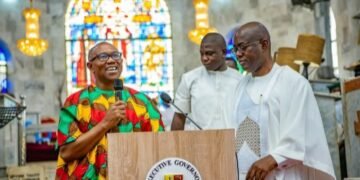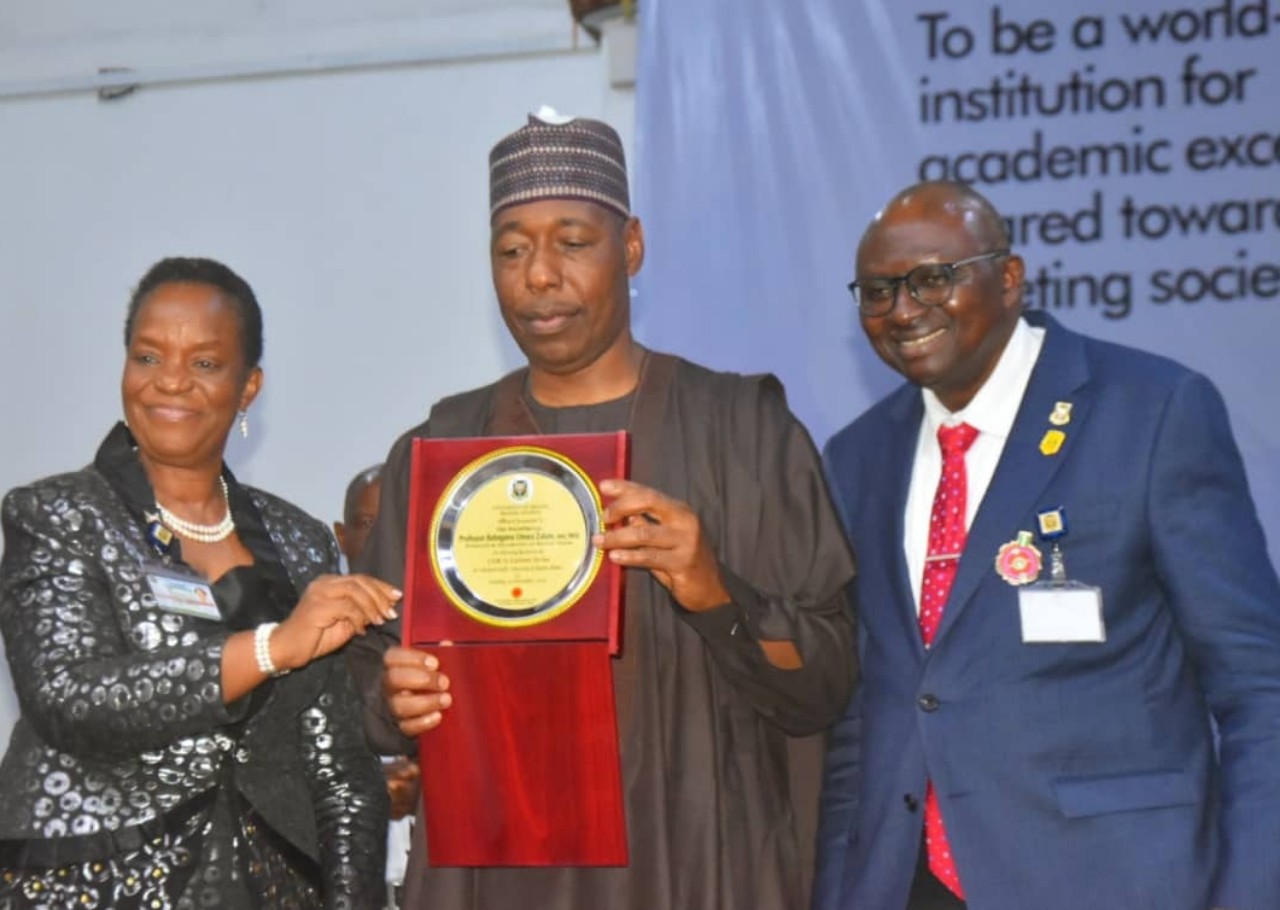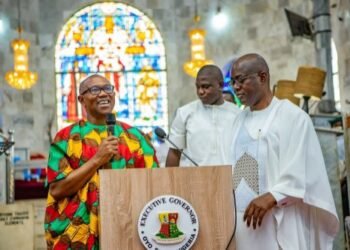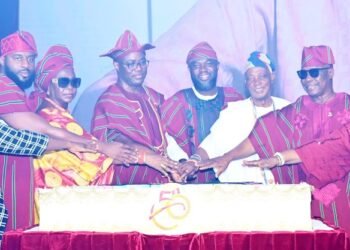He also declared that a responsible leadership should always be in a position to anticipate the expectations and strive to meet the yearnings of the citizens.
He stated these while delivering a lecture at the occasion of the 75th Anniversary of the University of Ibadan, Ibadan, on Monday.
The governor spoke on “Leadership, Citizenship And Meeting Contemporary Social Challenges In Nigeria Today”, saying having expectation from the leadership is the right of the citizens.
According to Zulum, when hopes were not met because of the ill-preparedness of the leadership, the country would end up with the issue of brain-drain.
He explained brain-drain as the migration of ideas and strength to places where they can flourish “or as we now call it, Japa syndrome.”
Governor Zulum said: “Expectations for things to be better, expectations to hope, expectation to have aspiration for a more fulfilling life are indeed the right of the citizens.
“Leadership in whichever form or shape or level has the unenviable responsibility to anticipate the yearnings of the people and to meet those expectations.
“When anticipation meets expectations, there is a confluence of social peace and stability.
“When hopes are not met because leadership is ill-prepared to meet such hopes then we end up with brain-drain- the migration of ideas and strength to places where they can flourish or as we now call it, Japa syndrome.
“Today’s generation of young citizens want to Japa. Older generations reminiscence on the past with fondness mixed with some level of regrets.
“When people continue to believe that the past of the nation was better than its present, then it is a strong call for a reassessment of the place role of leadership and the responsibility of citizenship in nation-building.”
The governor however advocated symbiotic leadership and citizenship responsibility as a way to overcoming contemporary social challenges confronting the country.
“As we celebrate our Alma Mata at 75, it is therefore apt to focus on education as an example of the relationship between leadership, citizenship and meeting the contemporary social challenges of our time.
“Today, I will not stand here to give you academic definition of leadership or a pedestrian analysis of citizenship because we have enough examples to draw from around in contemporary time.
“I must warn you though that from personal experience, leadership is a great responsibility. I think in the future we should put a warning label on political aspiration.
“Something like- ‘being the governor would reduce your hours of sleep’, or ‘that the office of the governor has no closing hours’- and these statements are true if you are truly serving as you should as a leader.
“Moving forward, I will also not reel out an elaborate litany of social challenges we face in this country.
“This is because we can spend hours simply examining the state of our roads, the conditions of our health systems, the deteriorating quality of education and inadequate distribution of basic services in rural and urban centres.
“One thing I love about this country, of course, is that we all know the problems. We all have a million and one solutions to solve our problems.
“As a matter of fact, the commonest solution is not to look within ourselves as citizens but to raise our heads up and point at the ‘leadership’.
“Indeed, it is right to point at the leadership for every and all solutions. That is called accountability. We are voted in to serve the citizens.
“However, citizenship devoid of responsibility produces leadership without accountability and an endemic system of strategic failure that becomes the albatross of the leader and the led.
“As we mark this important occasion today, I would like to invite us to a new dimension of reflection on leadership and citizenship.
“We are interested in the dimension of leadership that delivers results that matter to the general public.
“We are interested in the dimension of citizenship that is so empowered as to call leadership to order and refocus the dream of the nation in the direction of greatness.
“Nigeria has come to a point where it is imperative to graduate from the perpetual position of potential to actual greatness. Everyone has been talking about the potentials of Nigeria for years.
“It is time for us in this generation to translate potential to actualisation of greatness in education, infrastructure, basic services, security and an environment of peace that promote creativity.
“There are glimmers of hope that Nigeria can be great and Nigeria will be great. You see that in the number of great things that Nigerians are doing on the world stage in the sciences, arts, music, literature, health and so on,” he said.
He said a key part of the national problem could be traced to collective inability to accept that the solution that worked for Nigeria in its early years are not more adequate to solve contemporary problems.
“Here, I am trying to take you into the inner reflection of our thoughts and the guiding philosophy of our leadership in Borno State.
“Many of you must have read or heard about the number of mega schools we built and are still building; the number of teachers we are training; the number of health infrastructure we are building and many other things.
“It is because mega population would produce mega needs and mega needs would require mega solution. Period.
“Citizenship is as important as leadership in the discourse of national growth.
“We are at a point in our nationhood where politics of religion, politics of ethnicity and politics of division are perpetuated through the passive and active participation of the citizens,” he said.
Governor zulum said he was not out to apportion blames but to provide a broad perspective that can help to see issues in a different light.
“If we continue to put plasters on the bruises of our collective national failure, there will be no progress. In fact, I dare to say some of the basic solutions one would proffer here might not be popular.
“But it is better for us to know our options and be prepared for the consequences of our choices,” the governor added.
Governor Zulum further said: “Today, I will not speak about the tax base in Nigeria and the low level of internally generated revenue for national development.
“Expectations cannot be met when leadership is without the necessary resources to govern, manage and deliver results that matter to everyone.
“We must as a nation rise above narrow perception of issues and understand that there are broader contexts that we cannot simply shy away from.
“In the face of dwindling resources and mounting debts, alternative sources of income to fund our universities must be explored.
“In closing, because the leadership we produce is largely a reflection of the quality of citizenship we have, we challenge ourselves to do more in producing educated citizens from amongst whom great leaders may emerge to drive the engine of progress in the right direction.
“My final parting words here today is to encourage the citizens of this great country that, while things take time, we all have a responsibility to show leadership in whichever sphere of influence we have.
“As we celebrate the great University of Ibadan, as the new generation of citizens, we must draw inspirations from the founding fathers and leaders like the late sage, Chief Obafemi Awolowo and other leaders of his time who dared to dream and gave us an institution we are in a position to celebrate today.
“We won’t be there in the next 75 years but the citizens of that generation would know that we have tried our best to bequeath to them a legacy we received not as received, but better for them to have.”
Speaking earlier, Vice Chancellor of the University of Ibadan, Professor Kayode Adebowale, thanked the governor for accepting to give the lecture, one in the series of lectures organised to celebrate the institution at 75.
He appreciated Zulum for all he was doing for Borno State, noting that records showed that, in his first term as the governor, he undertook 556 major projects and completed 70 per cent of them within four years.
Professor Adebowale said the bulk of the capital projects by Zulum were on education, adding that he built mega-secondary schools and equipped them enough to compete favourably with some universities.
“This feat of the governor was openly acknowledged by the Shehu of Borno and the National Assembly as having gone above and beyond the accomplishment of any previous governor of the state,” he said.
The vice chancellor quoted Zulum as having said: “Although I am the governor of Borno State today, I became the governor by coincidence and providence and not by manoeuvring, polishing or vanishing of politics in the pursuit of a career.”
He therefore asked: How many of us can say that? He also declared: His Excellency epitomises the ethos of an alumnus of the University of Ibadan.
“I want to say that the University of Ibadan salutes your fearless doggedness and unparalleled resourcefulness.”
He said Zulum, by the lecture, would enable the academic community to benefit from his wealth of experience, both as an academician and as a state governor.
“The lecture will enable us to benefit from the experiences he had acquired over time, not only as an academician but also in the course of the governance of a state which sometimes ago, by mere hearing of the name of the state, frightened anyone outside. But now, Borno State is one of the most peaceful states in Nigeria.”
In his welcome address, chairman of the UI at 75 Committee, Professor Peter Olagbegba, said Governor Zulum was the natural choice to do justice on the topic.
The decision, he said, was based on the fact that he will not be talking just theories but also practical tools he had engaged in the course of serving as the governor of a state.
“To state the obvious sir, Borno State was a state of insurgency when you took over as the governor.
“But you were able to rally your people, gave them hope and started the work of building, not just infrastructure but you started building the lives of your people. Today, hope has returned to Borno in place of despair,” he said.























